Lynn shares her thoughts on how to overcome Fibromyalgia and get your life back
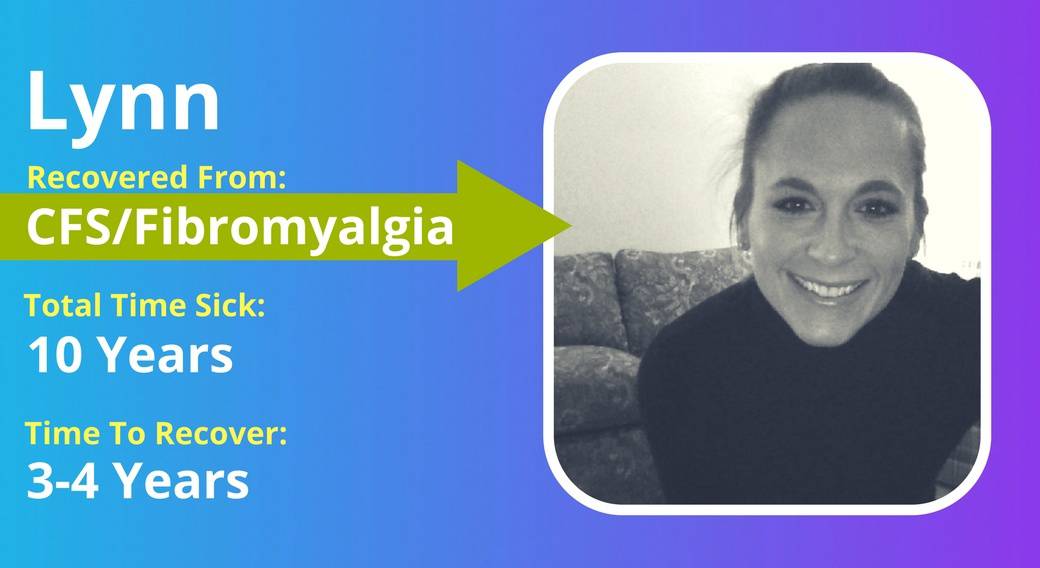
Having recovered from CFS/ME & Fibromyalgia some years ago, it might sound strange to hear that I was inspired by this interview, but that is exactly what happened.
If you listen carefully, you will hear some critical distinctions in Lynn’s story of recovery that will be useful to anyone still afflicted with Fibromyalgia or Chronic Fatigue Syndrome.
In this interview, Lynn openly shares her darkest moments and shares what she believes it takes to recover.
What makes this Fibromyalgia Recovery story even more exciting is that when Lynn started her journey, she had no concept of why she was ill or what she needed to do, but her instinct and determination allowed her to recover anyway.
Regarding Lynn’s thoughts on;
How to Overcome Fibromyalgia
Here are some interesting highlights to look out for:
- How did Lynn turn around from hitting rock bottom?
- What does she think is the key to recovery?
- What is her Mantra that was powerful enough to give her the resources to dig her way out of Fibromyalgia?
- What is the most amazing power that Lynn recommends everyone should tap into?
- What did she do 3-5 hours a day to help her recover?
- What did her doctor who prescribed morphine for 4 years to her say when she went to him fully recovered looking so fit and healthy she was barely recognisable?
- How did Lynn come to turn around her ability to deal with pain?
NOTE: Lynn’s thoughts on exercise obviously may not apply to you if fatigue is your predominant symptom as opposed to pain.
Please leave a comment at the bottom of the page!
Here are some social media images for sharing:
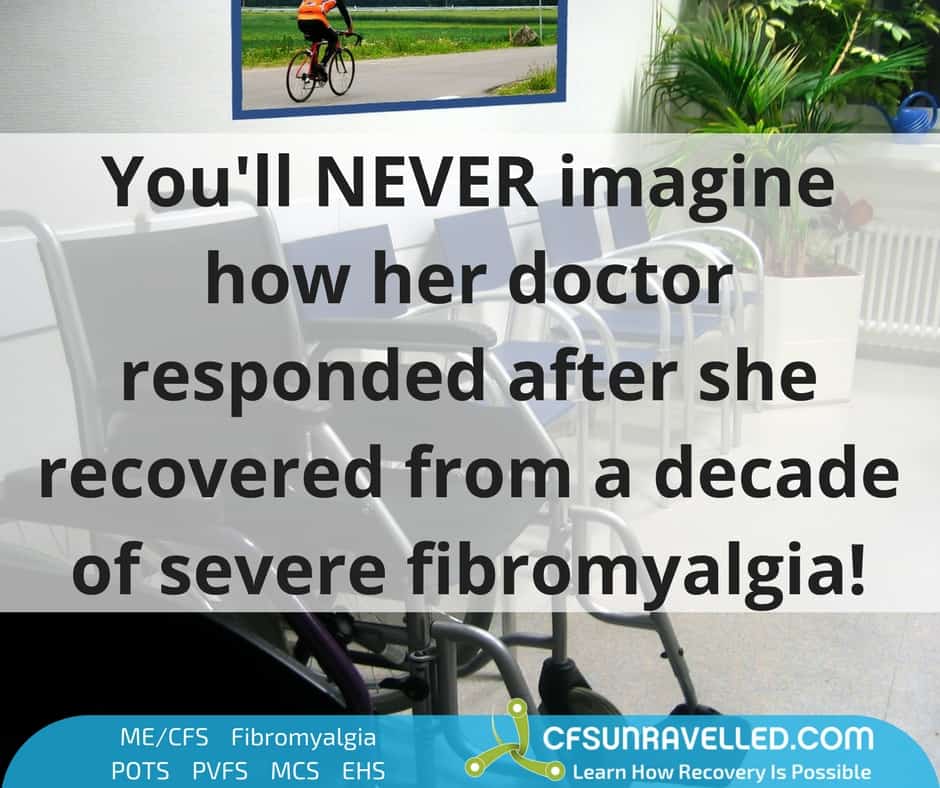
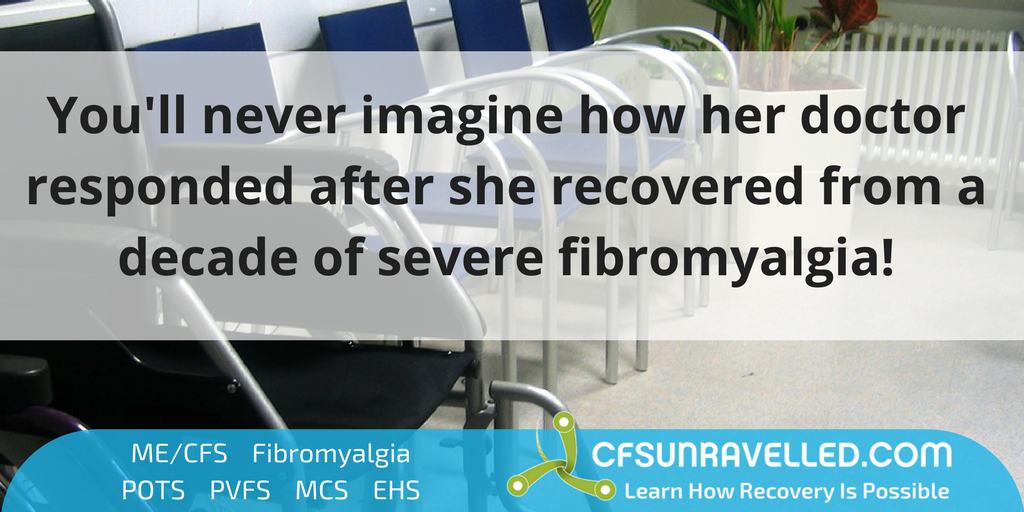
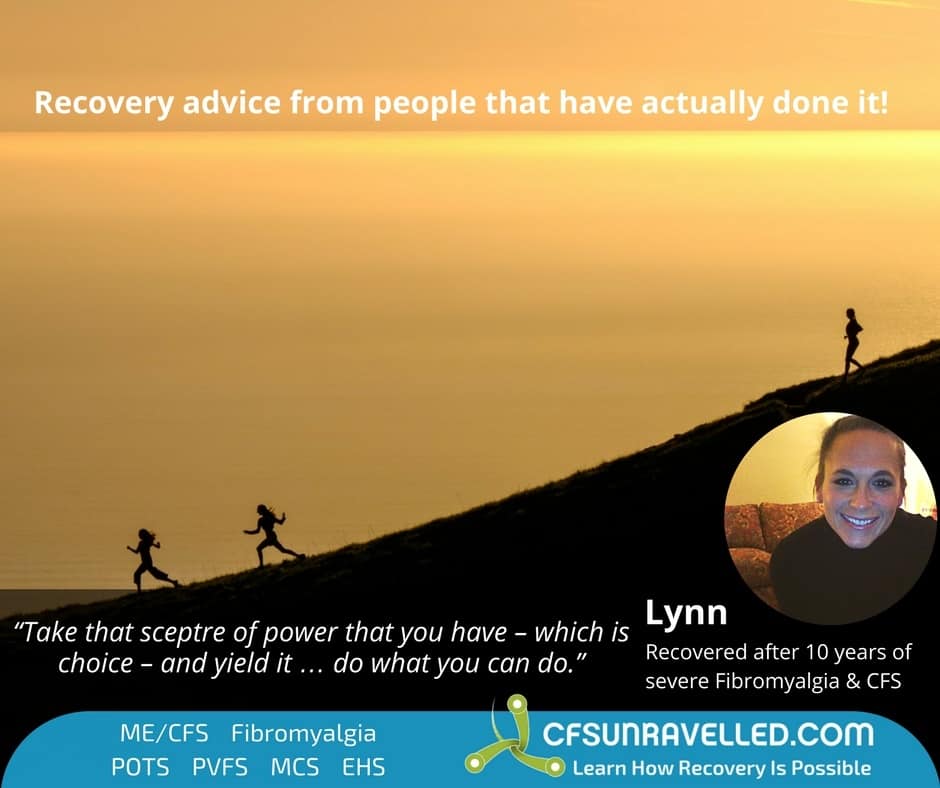
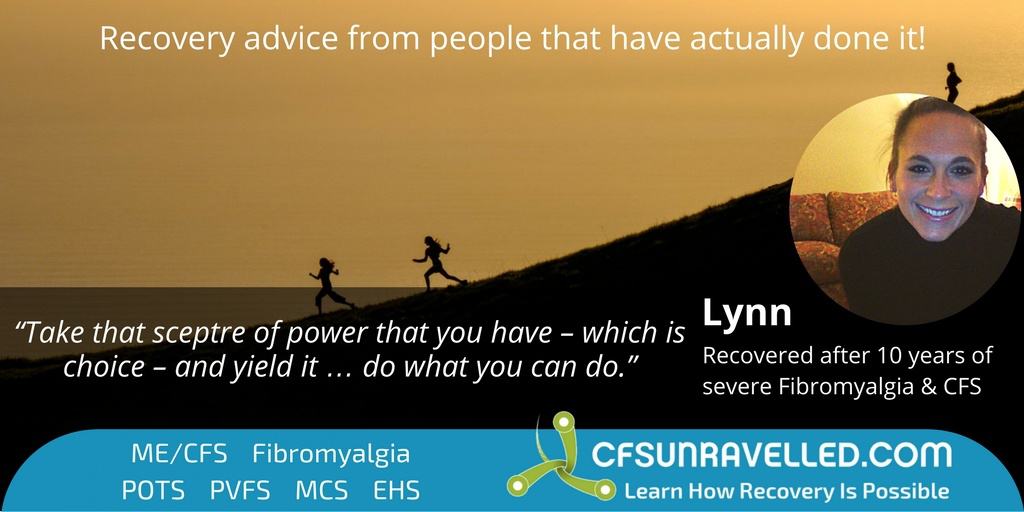
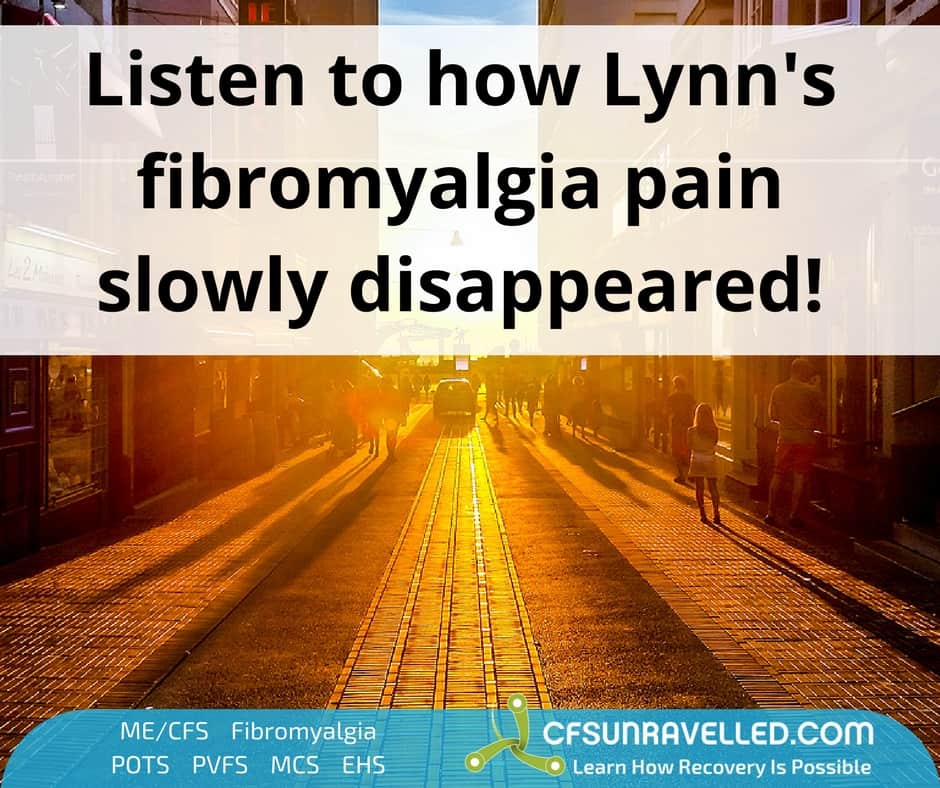
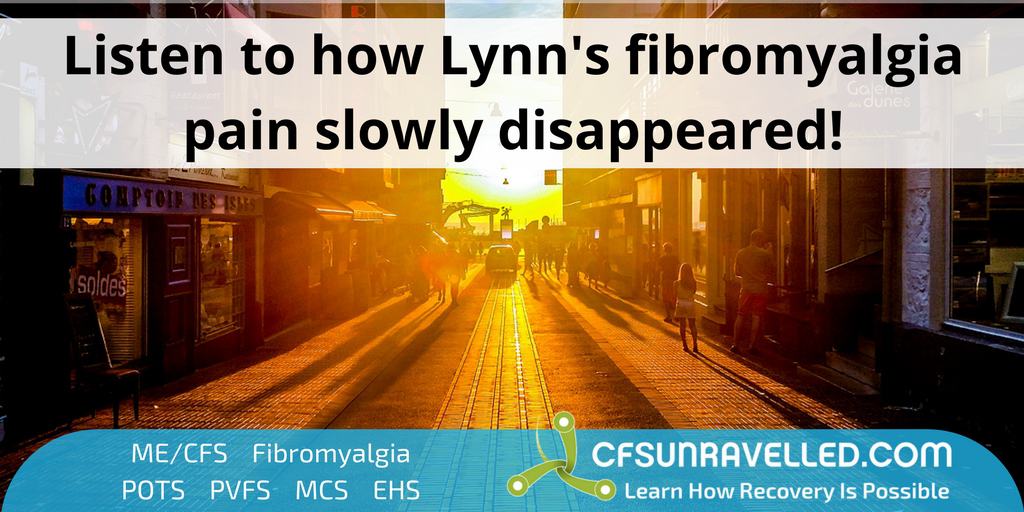
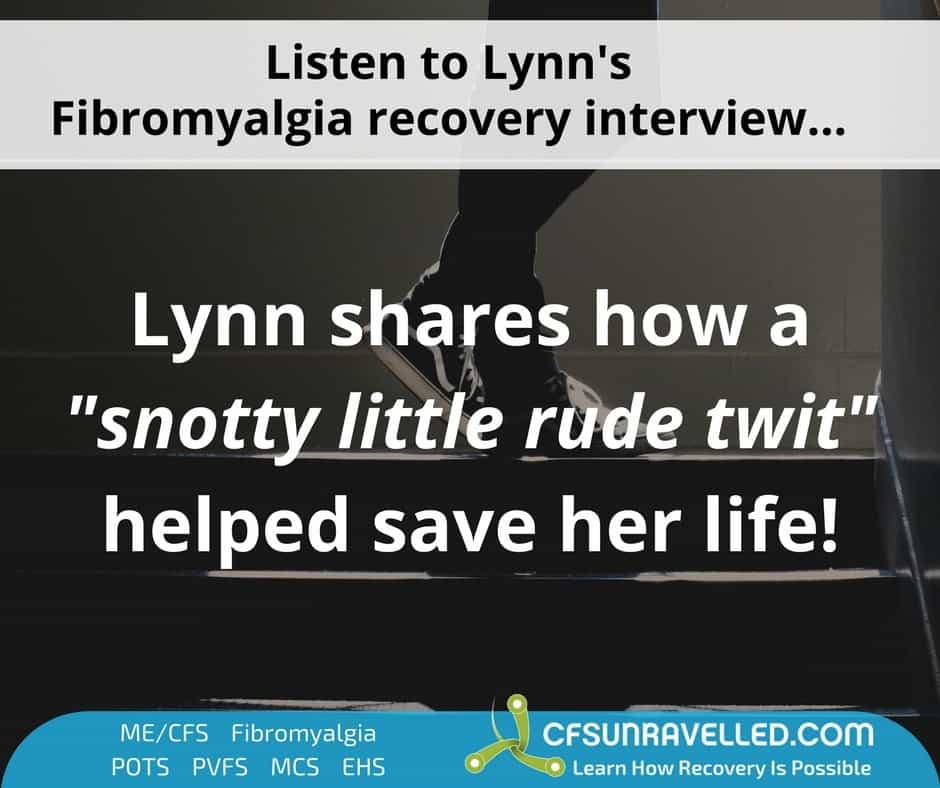
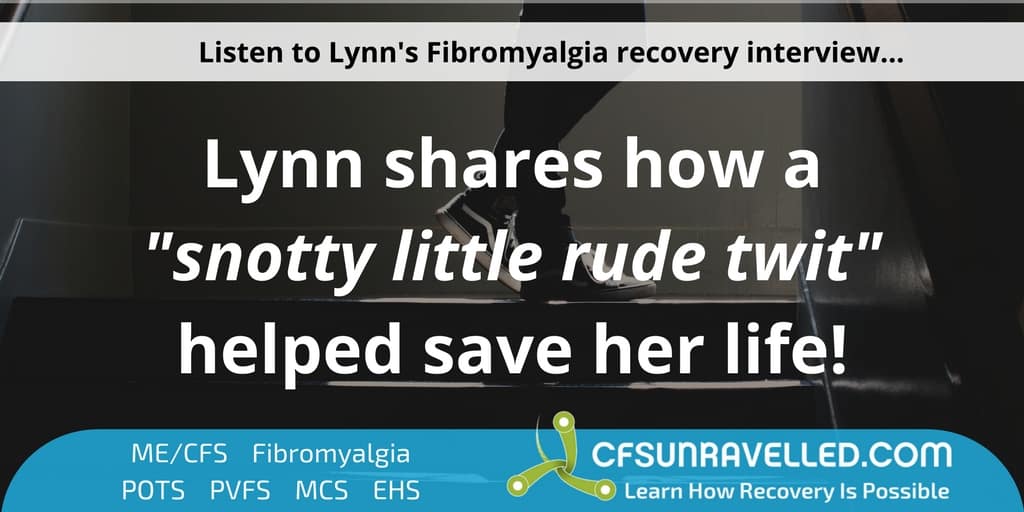
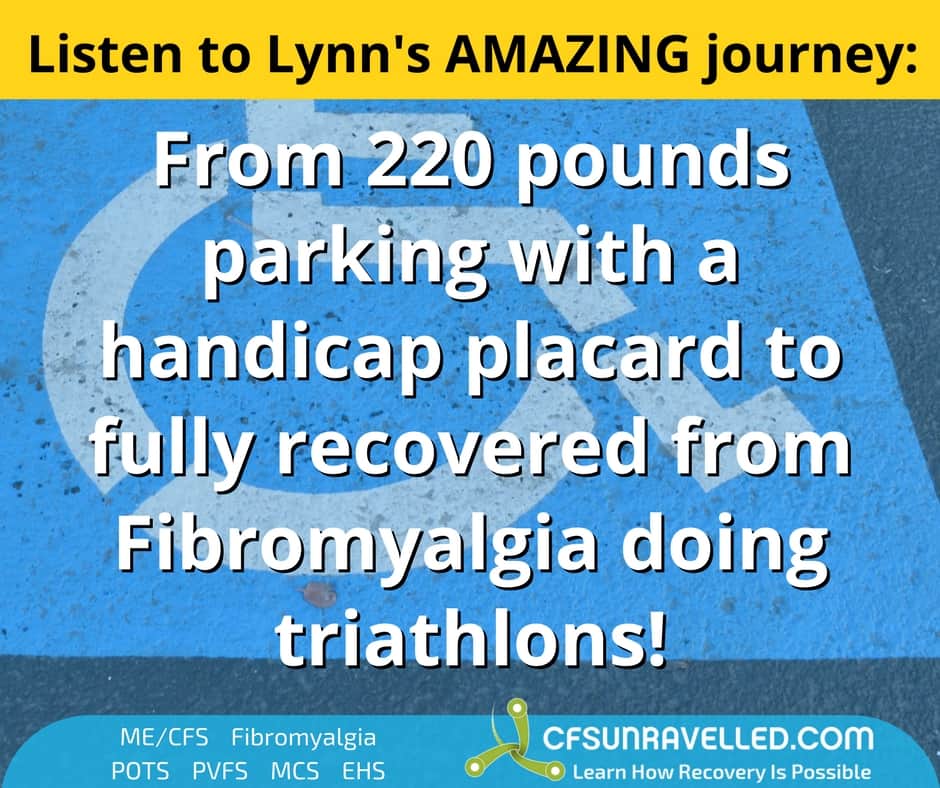
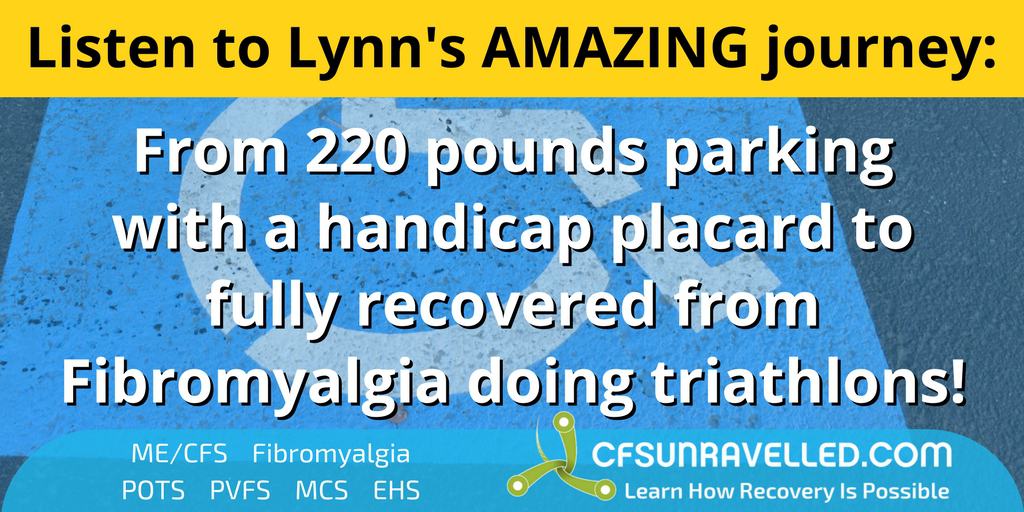
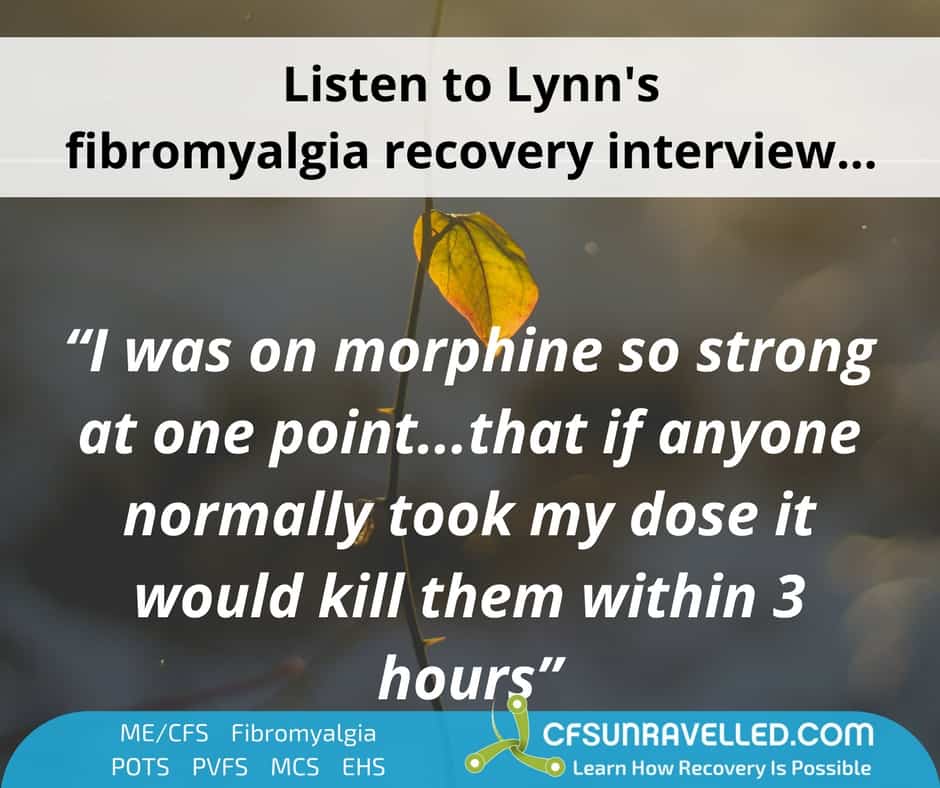
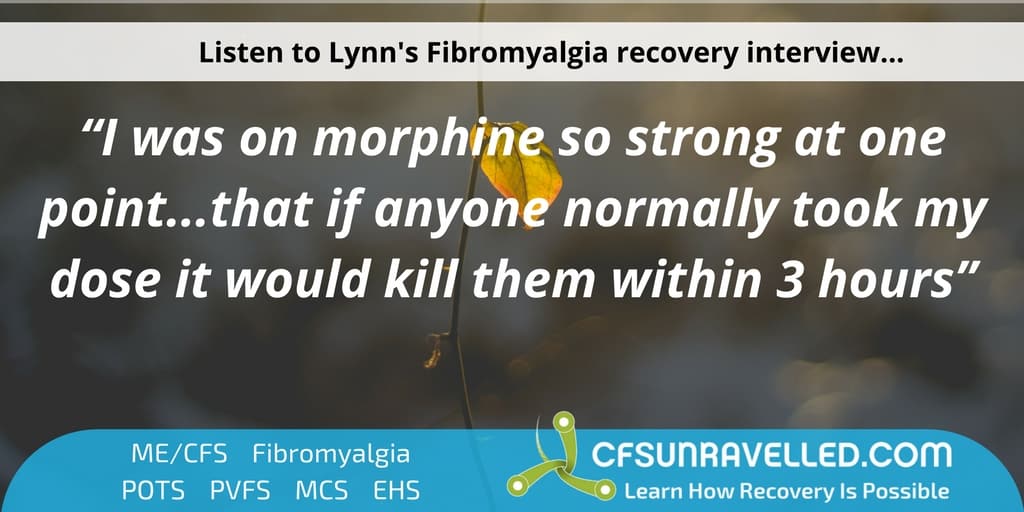
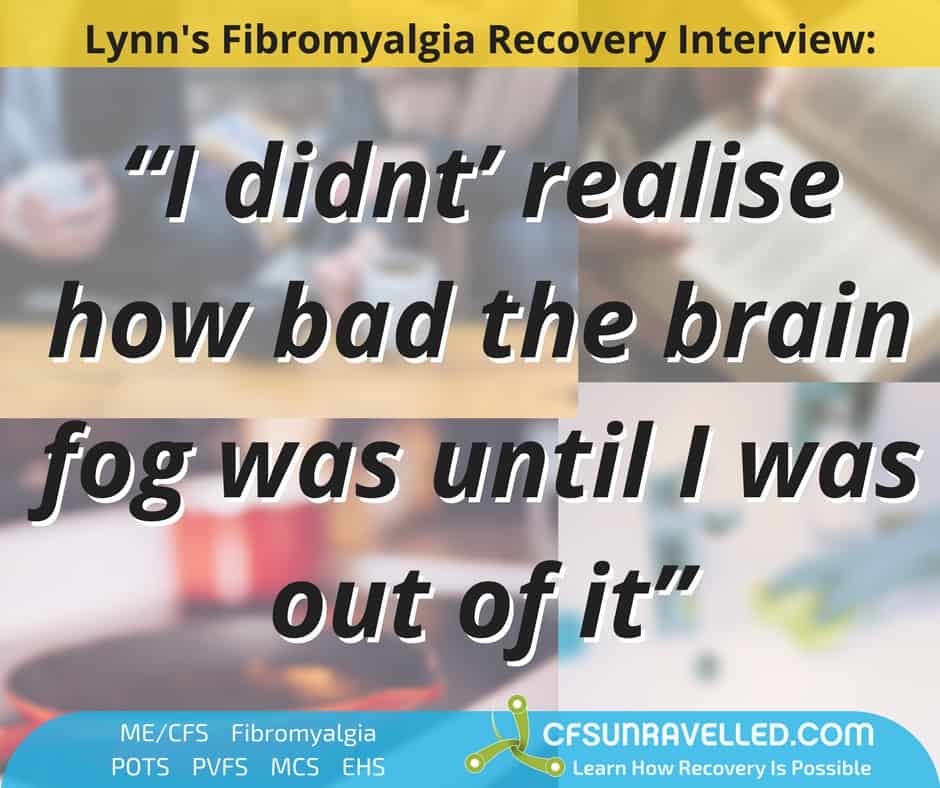
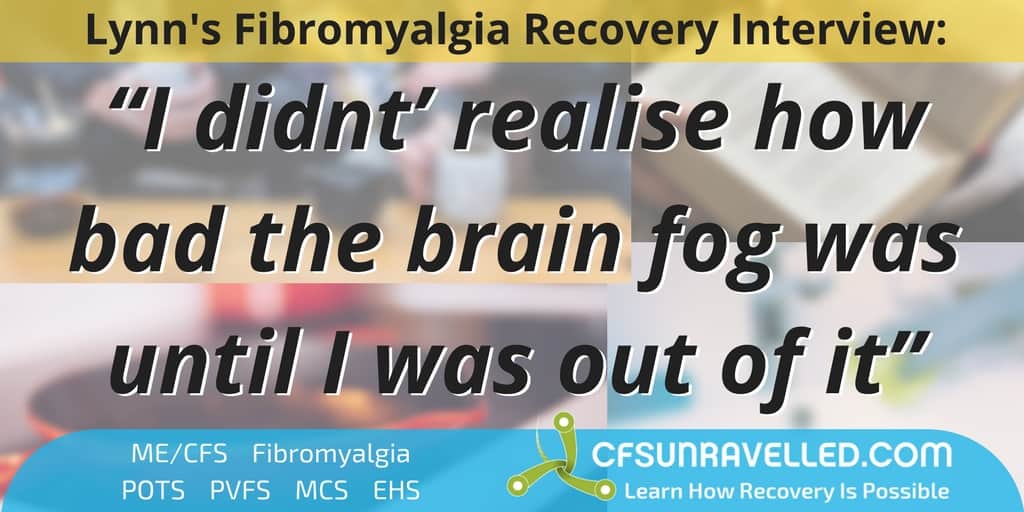
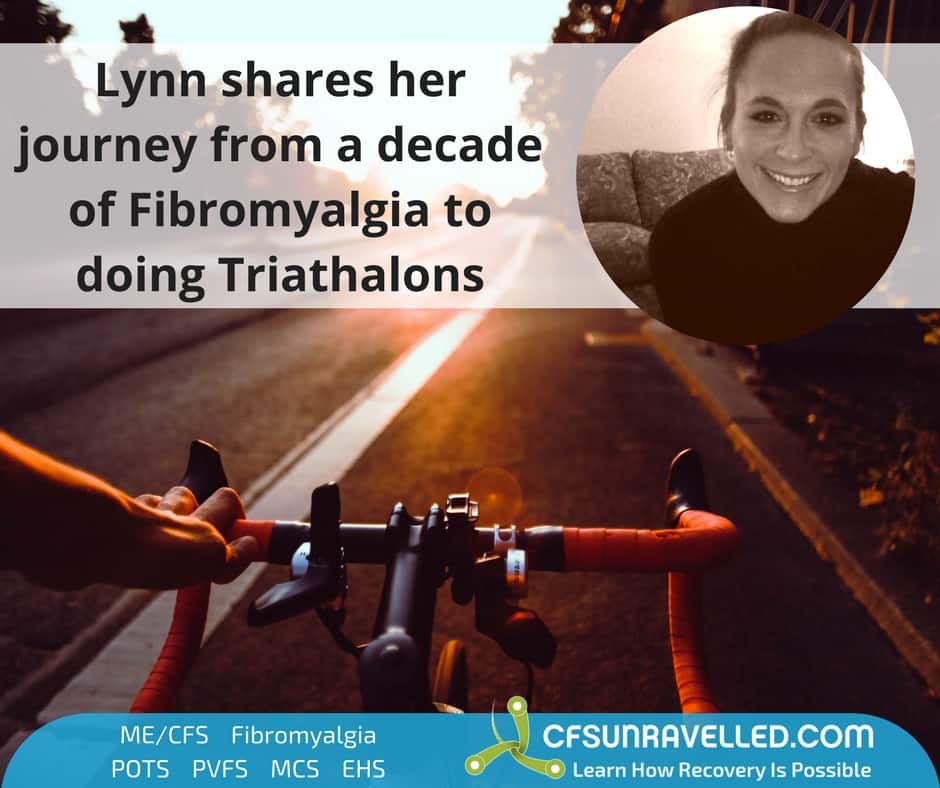
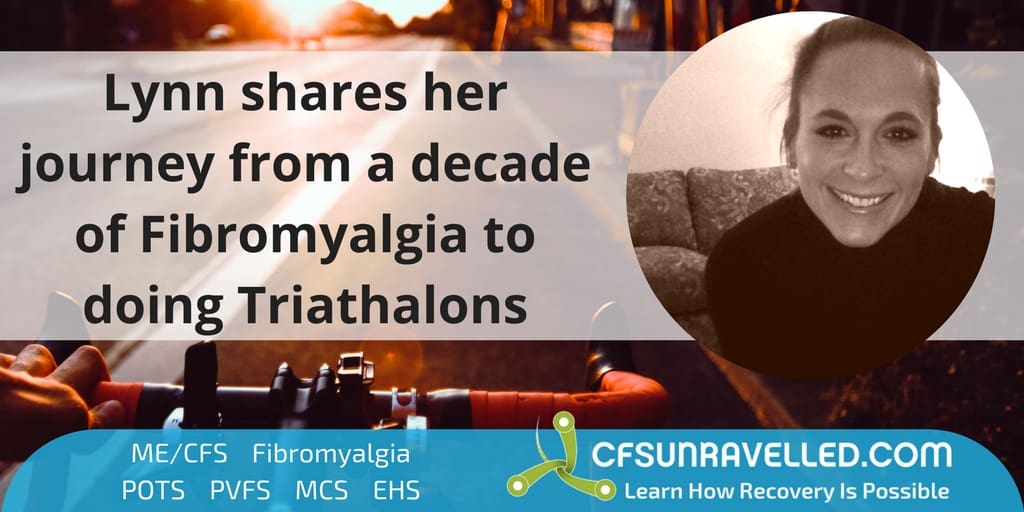

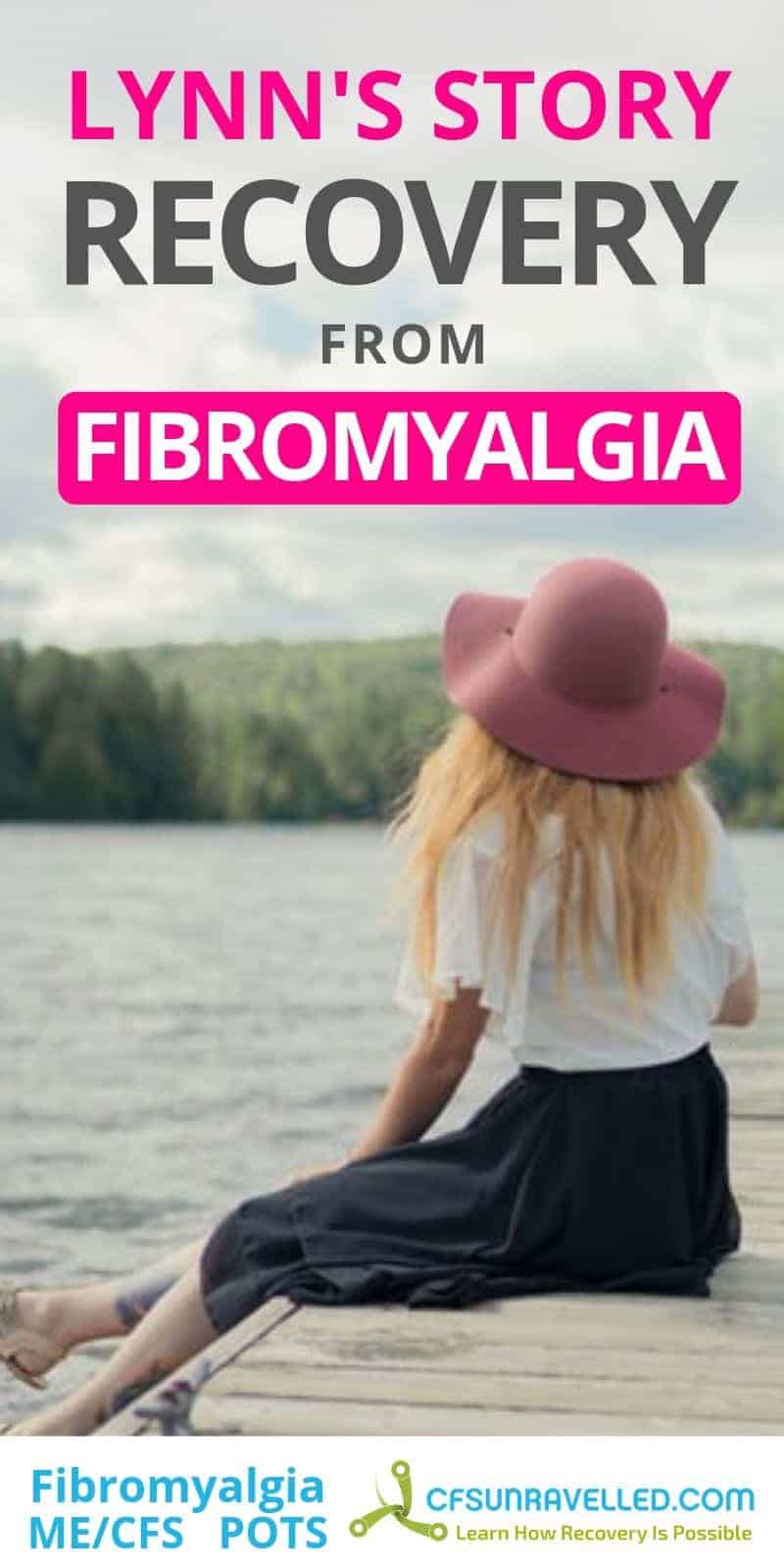
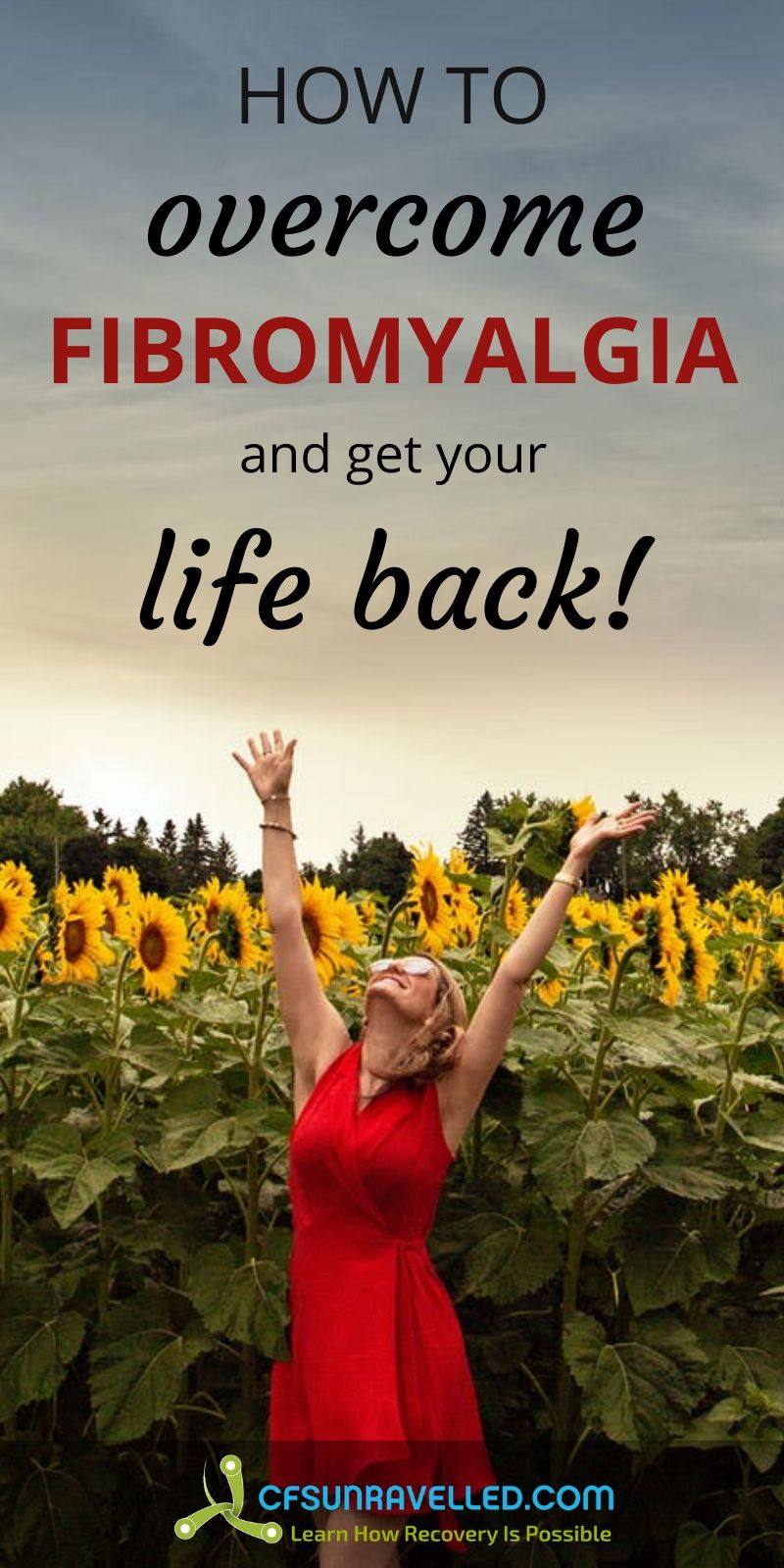
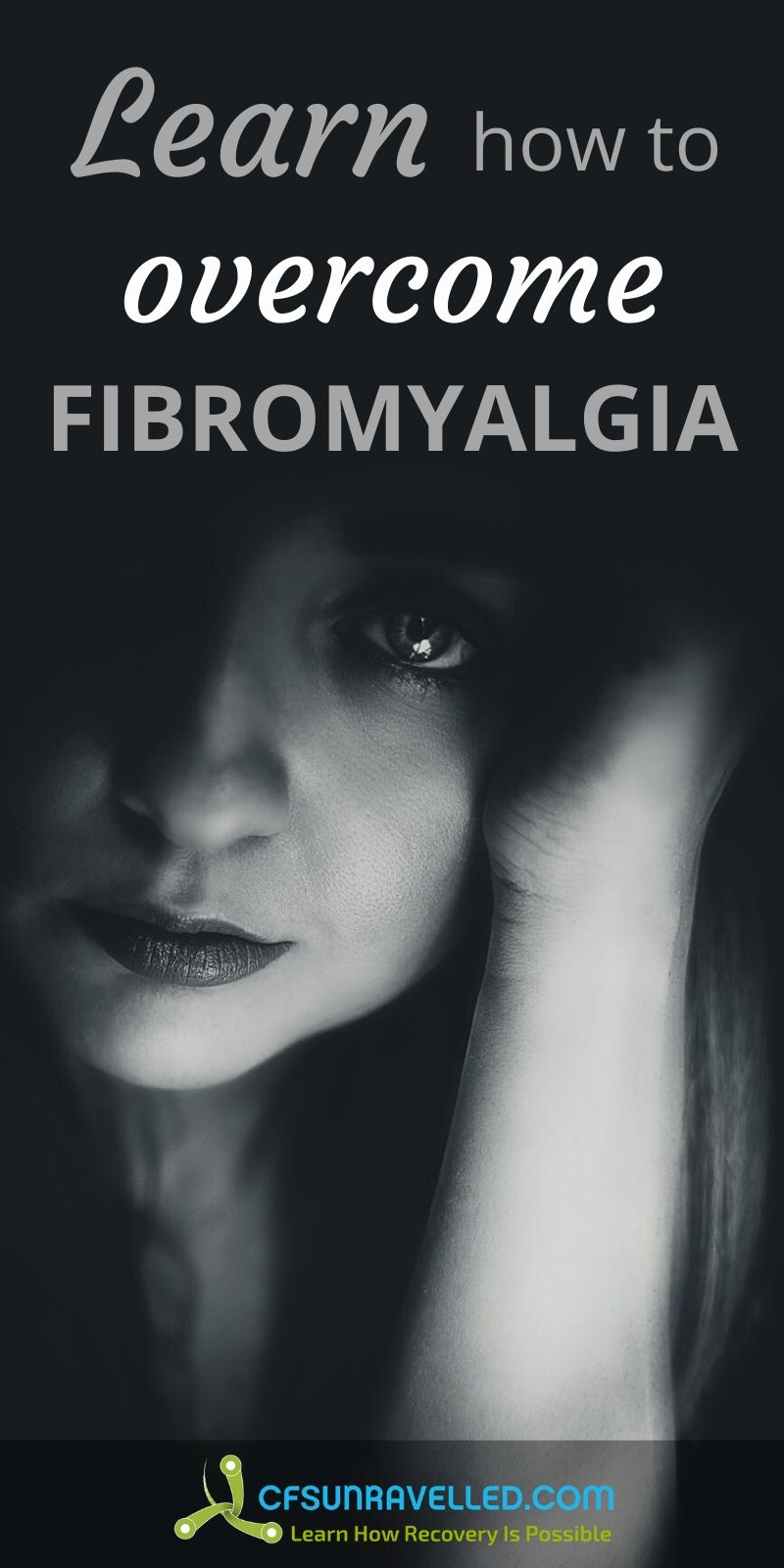
I LOVED this interview, such an inspiration and such insight – really helpful. Again this repeats the idea of taking a multi-pronged approach to recovery. Mainly I found her shift in attitude seemed to be the most helpful for her – I believe that hitting rock bottom really can be a very helpful place for many of us. I loved her idea of making the right choices in every area of her life and every time – hugely helpful. I’m not sure the approach to exercise would be ideal for people with CFS which is different to Fibro, but so much of what she has talked about applies to both and in fact probably all chronic illness. I loved the doritos analogy – everyone whether sick or not could benefit from this. Thank you both for sharing this.
Hi Alex! Yes hitting rock bottom seems to be a common theme amongst those that recovered. Something changes from a want to a must which Lynn articulated so well. It was my experience also. I think before that, we only make haphazard attempts (hence the cupbouard full of half used supplements!) and without enough positive feedback, we simply don’t follo through on anything.
Fibro and CFS (because of having the predominant symptom being different), work slightly different and hence Lynn’s approach with exercise is not a good idea for those with ME/CFS until they make a fuller recovery. I think most of us realise that GET is a disaster. Fatigue was secondary for her, so for those with only limited fatigue, this may be useful.
If you have seen my video explanation, you will see that I suggest that Fibro and CFS whilst different have the same underlying cause in my view.
Well done on your sensationally positive attitude, I am glad you got something out of it!
Thank you Lynn for sharing your story. True inspiration and hope for others. Totally resonates and sounds almost identical to my jouney, both pre and post stories of it. Thank you xox
And Dan, thank you again for sharing the love!
You’re welcome Christine! Thanks for sharing it right back – 🙂
Part of what she said is really good – about making the best possible choice every time. However most of us don’t know what that is. For instance people believe that triathalons are a smart thing to do. They are not. The put undo stress on the body that is absolutely not needed for good health and fitness. A hour half walk each day outside is sufficient. If she keeps up with her admitted high stress lifestyle, her fibromyalgia will come back. She made a lot of good choices but is still making some bad ones without realizing it. When it comes to diet, the advice is always changing about what is good for us and it can be very confusing. She talks about drinking lots of tea, again not a good idea because it contains caffeine. Better to drink herbal tea and decaf green tea. With people who don’t have severe exhaustion a program of gradually increasing physical activity can work but if you have exhaustion (CFS) and you push yourself, it makes it worse. It has to been done very carefully and you will reach a plateau where you can’t increase your activity level any more. I know, been there, done that, many times.
Hi Kim – glad you got something out of it.
I hear what you are saying about Triathalons and I share your views about extreme endurance sports. However, the wonderful thing about the story is that it really demonstrates that Lynn has made a full recovery! It strikes me that she is fully on top of her health and given how she recovered, I would be extremely surprised if she ever suffered any significant relapse.
Yes, GET is not a good idea for people with CFS, and I describe why in CFS Unravelled. However, where fatigue is not your dominant symptom (Lynn predominantly had Fibro), it seems to work well. But I agree that people with CFS need to be keep this in mind!
Your comment about tea is also valid in general. Whilst black tea has some vitamins and anti-oxidants, it certainly is not great during recovery as it strips minerals out of our bodies and the caffeine is nothing but bad news if you are to agree with my explanation of the cause of ME/CFS/Fibro. (none of that stops me enjoying the daily cuppa now that I have recovered! – 🙂 )
However, I don’t think Lynn was talking about black tea, she was talking about all maner of ‘teas’ which many other people might call herbal infusions. This have shown themselves to be amazingly powerful for healing, including green tea which obviously might not be the best choice during recovery due to the caffeine.
Regarding diet, in my mind it is pretty clear what is required during recovery, and I think it is critical which is why I have discussed in such detail!
Thanks for your comments.
This was so utterly inspiring & with much wisdom & a deep awareness coming from this lady.
However I am a little puzzled by the fact that she suffered from Fibromyalgia & yet your interview with her assumed she had ME. From all I have read these are not the same thing. I have a friend diagnosed with Fibromyalgia. He suffers severe pain but does not have the multiple symptoms that I have ( diagnosed with ME). I actually have very little pain in that sense – extreme headache & severe flulike symptoms – I could go on.. Lynn seemed to push herself physically. I have tried this & paid the price severly. Much of the interview was extremely helpful but this fibro/ME issue has left me confused & annoyed .
grace
Thanks for your comment Grace – I am so glad you found it inspiring.
Yes, her diagnosis is Fibromyalgia and Yes, the predominant symptom is different to ME. The reason for the comparing reference is that in my view ME, CFS, CFIDS, MCS and Fibromyalgia all have the same underlying dysfunction driving them, even though different symptoms or triggers are manifested in the person experiencing the illness. If you watch my video explanation, hopefully you will feel a little less confused. I go into more detail in the book.
See my comments above about pushing physically – you are right that it isn’t appropriate for people with ME/CFS.
I hope you can overcome your annoyance and get the postive messages from Lynn’s story. Besides the exercise for CFS/ME people, I think her suggestions are extremely powerful for all people afflicted with the illness.
I
Great interview – it sounds so simple to make all good choices and something I will keep in the forefront of my mind from now on.
Thanks for the +ve feedback Ruth. Yes, the simplest things are often the best! 🙂
Thank you so much Dan for creating this wonderful website and giving patients access to such inspiring stories of recovery! Your work has played an important part in my own recovery process,particularly in relation to the feeling of isolation which comes with this illness.I am definately not alone and even though I have a little way to go I know that I CAN recover and that in itself is the magic bullet for me! Thank God for people like yourself.Believe me you have a huge positive influence when it,s needed the most.With my absolute gratitude,Regards and God bless.
Thank you for your lovely comments and feedback. You know Julie, a few years ago I felt exactly like you in terms of the isolation. Nobody seemed to recover, it was all just negative out there. In fact, so many people on facebook and the web still say things like “if you recovered, then you never had it” – that’s how powerful the beliefs are. I hope to turn that around for as many people as possible, because what one can imagine, one can achieve, what one can’t imagine, one can’t achieve.
I smiled a bit at your comment, because I think I would have felt the same way if I came across some positive recovery stories back then – JUST KNOWING SOMEONE has done, would have given me the hope to help deal with the despair of it all.
My message to you all – don’t despair, keep your eyes on the price. There are no guarantees, except that recovery is definitely possible and having real hope is worthwhile.
Hearing your comments makes all my hard work and sacrficie worthwhile! – 🙂
It is important to untdrseand that yoga is not a competitive practice. You need to tune into your own body and how it feels. There may be people in the class who are able to do certain poses that are difficult for you. Don’t try to do them if it hurts. Ask if there is a modification that you can do instead. You may also be able to use props such as blocks or straps to make it easier for you to get the correct alignment in the pose. It takes time for your body to open up in a pose. Don’t try to force or stretch too strongly. Let your body gently relax and stretch. You can help it along by breathing deeply and directing your exhales to any tight spots. Yoga is about balance. It is the balance of your mind, body, and spirit. What you learn in your class will also help you in your every day life. Have fun.
I enjoyed the interview and I am hoping that I can do some of the things she did and what your book says. I like to start with what is the best choice I can make. I need to see some positive changes in my life and this is encouraging to me to hear and see that there is possible success, I need to try and see what I can do to kickstart this road of recovery and hopefully it will work for me too. Thank you
Glad you enjoyed it Sharlene!
If you ever read my book Discover Hope, you might have come across the poem ‘little steps’. That’s what it is all about, lots of little steps, consistently taken adding up to real results.
Dig deep and find your personal triggers and your personal roadmap to recover. Remember as I always say, treat the cause, not just the consequences.
Hey Dan. Thanks for taking the time to record this; I appreciate the encouragement today. Cheers, Graham
Hi Graham.
Thanks for the appreciation, all this takes much more time than people realise – just the graphics and processing and uploading and so on – lots of work! So I am glad that it is making a difference and people are finding encouragement.
When we are making progress, kicking goals, then our beliefs are strong and we feel confident. When things go wrong and we have setbacks, our confidence quickly falls apart. I think only someone who has tried for years to get over this horrid illness can truly appreciate how little it takes sometimes for us to lose the faith.
So whenever you are down, listen to the interviews – listen to the real voices of people who have suffered and wresteled with this illness just like you and eventually came out on top.
Stay positive and keep making your best choices! 🙂
Thanks again Dan; I realize how much work goes on behind the scenes to make this happen! 🙂
Thanks Graham – yes, nothing is quick or simple! You should see the challenge in trying to get the book to print format stage – it all takes a lot of time and money, but at least it’s appreciated out there on the most part – so that makes it worth it! 🙂
Very inspiring interview. After having CFS for so long, I was diagnosed in 1991, I am starting to believe that recovery is possible and that is key! Once again a multipronged approach seems best! I have been using your book Dan and gradually making changes. Thank you for the wonderful work you are doing!
‘m using your book and gradually making changes. It’s kind of funny though, I have never dreamed about participating in a triathalon, I’m trilled that I can walk 10 minutes each morning! Thank you Dan for the work you are doing. You are helping an “army” of us!
Wow Teri, that’s a long time – you are doing great to remain positive! The multi-pronged approach made sense to me which is why I used it and wrote about it in CFS Unravelled, but it is interesting to hear it over and over again when I speak to people that have recovered.
Thanks for your positive feedback – glad someone out there is listening – 🙂
Thanks Dan for bothering to reply to an ‘annoyed woman’ I guess my irritation (dissolved thanks be to God & all the others…) is really if I look at it about all this confusion round names for this bewildering illness. This vagueness is not helpful when dealing with the medical profession. it simply encourages doubt to creep in..
anyway besides that I so appreciate all that you’re doing & having read your book I’m about to find myself a good naturopath & get well.
You’re a total hero to have done all this research -I have great confidence in this book & will hopefully
be one of the CFS recovered stories in the future
With Metta
grace
Thanks for your positive comments.
You know, it’s normal that you are an ‘annoyed woman’. I was an ‘annoyed man’ for a long long time. That’s why I get it when people say what they do, even the stuff I don’t like to hear. Truth is, it could have been me at one point! – 🙂
I hope you listen carefully to the interviews. Virtually EVERY recovery interview will talk about meditation and for good reason. It’s not about ‘chilling out’ or not ‘stressing out’, it’s about directly affecting the central nervous system, which of course is where the ANS resides. It’s not a magic bullet, but it sure helps!
But you need to find your personal triggers!!! Remember to lift ALL THE ANCHORS!
I wish you the best with your ongoing recovery efforts.
Dan
I listened to the entire interview. While I am glad she has made a full recovery, I feel that she is blaming the patient a bit. Maybe she really had Depression or a Somatoform disorder and the increased endorphins due to exercise pulled her out of it. I was told for years that it was Depression and all in my head. I pushed myself trying to exercise, work and go beyond the envelope. This did major damage. I had sepsis due to a non-functional immune system due to ME/CFS. My NK cells function is a 3.I didn’t slowly decide my way into that.
Hi Angela – I often get this blaming comment myself and never relate well to it because I never blamed myself for being ill, even though I realised my part in it when I reached a deeper understanding.
Once those that recover realise how they got ill, they recognise how their behaviour has contributed to the problem. From this they usually take responsibility which is very empowering because it allows them to change towards improving their health.
However, blame is not helpful. There are usually many external forces that occur to bring about the illness, which nobody can have any control of (an accident, an infection, a surgery, a traumatic event, abuse, etc. etc.) However, those aspects that you are responsible for (even how you react to these events to some extent), are helpful to focus on because those you can change. Those you are not responsible for, are more difficult to change. I hope that makes sense.
ME/CFS and Fibromyalgia are definitely NOT depression. They are real physcial illnesses. Of course, nobody decides their way into immune dysfunction as you put it. However in both the video explanation and my book I describe how the ANS dysfunction directly leads into these problems. So perhaps in a way, your comment isn’t as strange as it sounds for some people with ME/CFS!?
I hope that makes sense.
Hi Dan,
I read your book and wholeheartedly agree with your ideas. I know that MASSIVE, unrelenting stress helped push my already vulnerable system over the abyss. Life happened: new baby, husband massively sick with a then unknown illness, surgery for me, then a virus…all came together in a perfect storm that could lead nowhere other than ME/CFS land.
Thankfully, in your book you take the approach that, regardless of how you got sick, there are things that can be done to get better…VERY EMPOWERING.
When I was listening to the recording, I was very inspired. However, today I was struggling to hold my head up, thinking “What better choice could I make right now?”. Then I thought, “What choices did I make that got me this sick?”…I became a bit miffed because I did not choose my way into this and a long series of bad choices didn’t lead me here either.
I am eager to put your principles into practice. My negativity was based on the slightly patronizing tone of the speaker (not you, of course) toward those of us who are still in the trenches.
When you have Fibro or ME/CFS, tthose “positive choices” can seem like they are a mile away sometimes don’t they? I totally hear you!
Thank you for your positive feedback Angela. You are right of course, you don’t choose your way into the illness, few people want to be sick! And it isn’t always bad choices that get us there, sometimes it’s just a bunch of stuff that happens.
Well done for staying positive. I don’t think Lynn meant any offense. I think she just wants people to realise that often we don’t actually do the things we know we should. Or that we don’t do them fully or to the fullest extent. I think that was true for me for a long time – I ‘tried’ lots of things, but it was only when I (through sheer desperation) become 100% committed that I had my breakthrough and achieved recovery – and frankly during my early set-backs my commitment wavered to say the least. But through my confidence in the underlying explanation that drove my actions, I managed to stay the course. That’s why I wrote CFS Unravelled. To give others that same opportunity.
🙂
Just watch, I’ll have my own recovery story for you in the future The title will be “From Sepsis to Strength”. 🙂
Sounds fantastic! I really look forward to sharing recovery stories of people who were helped by CFS Unravelled – ultimately, that is what this is ALL about. 🙂
Dear Lynn and Dan,
Thank you – thank you – thank you both for your commitment to sharing your details of recovery! Since being introduced to the concepts detailed in your book, Dan, I have started working with the Optimal Health Clinic via phone in London, England (I reside in California, USA) and have listened to MANY recovery stories posted on their website. Lynn’s recovery story, as well as your own, fall right in line with those. I think recovery stories are a vital part of the recovery process; I feel deeply grateful to both of you for bringing this inspiration into my life today.
Dan, I trust you have heard of the Optimum Health Clinic (your book took me to their “door” within a matter of days!). The clinic provides the framework and support for recovery that you outline in your book.
I can’t wait to share my own recovery story!
🙂 Susan
Great to hear about your progress, I look forward to sharing your story when the time comes!
Several people have mentioned this clinic – I am still not fully sure what they do, but at first glance they certainly seem to be in line with what I am saying.
The more recovery stories we collect, the easier it is for people to have faith and then confidence in their own possible recovery!
Thanks for sharing – 🙂
As a result of using supplements I didn’t need as ‘prescribed by the book, Treating and Beating Fibromyalgia, my health deteriorated and led me down a path of destruction. I developed tinnitus that caused severe anxiety from taking supplements so I was prescribed a tranquilizer. I was never informed as to how addictive they are. I kept taking them for years for anxiety, Restless Leg Syndrome, and insomnia. I took them on an ‘as needed’ basis and in a child-size dose. This year I realized that I was having new symptoms that were caused by the clonazepam. I have been trying to get off of it for four months and the withdrawal has been so bad that most of the time I just want to die. I have severe anxiety, panic attacks, depersonalization disorder and have lost the will to live. I will now never take supplements or medications again. This is an example of what I mean when I say that it is very hard to know what the best choice is. When people are suffering and can’t find an answer they turn to supplements, herbs, and medications thinking that that is a good answer.. When the meds help it reinforces that idea. I thought that clonazepam was a good drug for me because I initially had no side effects and it worked well. Now I know that it was one of the biggest mistakes of my life, but an honest one. I’m glad Lynn found things that led to her recovery but I think that everyone’s answers are different and she was just lucky. As well, I’m not sure she had fibromyalgia because she didn’t seem to have the long list of symptoms that we all have. Pain, insomnia, and fatigue don’t add up to fibromyalgia in my book but they are certainly part of the picture. I am also frustrated that fibro seems much easier to recover from than M.E., and those of us with exhaustion may not even have the energy to get up and get a glass of water or go for a walk. I do believe that it is possible for anyone to recover from any illness as I have read so many recovery stories, even by people who were near death. As for me, my mental and emotional health are so bad now that I don’t care if I recover from M,E. or not. I never thought I’d say that but I would be happy to die right now. I haven’t read your book Dan, but I’m familiar with the theory I think. After trying so many things over the years and having no success I don’t get sucked in anymore by so-called experts. I don’t mean any disrespect and I’m sure you are trying to be helpful. I wish everyone good health and happiness no matter where they are at.
Dear Kim
Thank you for sharing your experience, I share many of your concerns about treatments, which is why it is important to always get a qualified second opinion from a doctor if you take any drugs.
Realise that no matter how bad things may seem, the can turn around. Please seek help from a friend or family member as well as a professional counsellor!
People have a variety of symptoms, but most people I have interviewed tell me afterwards about other symptoms which they forgot to mention, so we don’t always get the full story.
Regarding a difference in the ease of being able to recover between ME and Fibro, I have not made this observation but can’t say for sure that isn’t true. However, keep in mind that I am saying it’s the same illness, just different symptoms. My fibro only came out late, so I predominantly had CFS/ME and I made a full recovery.
I understand your skepticism fully. (trust me, I was more skeptical than anyone!!!) You won’t find any magic single treatment cure in my book, it’s more about a tailored approach coming out of a deeper understanding. It’s a roadmap, but you still have to find your personal way and do the work. I wish it was easier. But perhaps getting a recovery coach would help you. Look for one on the net!
Kim, please seek some help. Every little step forward can make our life better. Even with this illness, there are many opportunities to find happiness and purpose in life, and remember as you said, people do recover! You are actually a big step ahead of many people I have spoken to because most people think recovery isn’t possible. I am not sure if you realise this, but your recognition of the possiblity is a HUGE step in your favour. If anything I have learned, it’s that the people that I have spoken to have all hit rock bottom first. They get to a point where being sick simply cannot be tolerated any longer and then they do whatever they can to get better.
Listen to Lynn again & “Make every choice your best choice!” Even finding something uplifting to do, sitting in the sun or doing anything that makes you happy. Every little thing counts.
<3
Sorry Dan, but I feel compelled to add my voice to the chorus of folks who aren’t too impressed with Lynn’s story.
Of course it was ‘easy’ for her to make choices if she was actually eating several donuts a day and/or drinking beverages loaded with high-fructose corn syrup. She was clearly poisoning herself…and I think most people with half a brain could figure that out. I truly don’t mean to be rude, but the choice she made was choosing to not be so incredibly ignorant IHMO.
What about the folks who eat healthier diets, yet may have been exposed to pesticides, solvents, heavy metals, etc., that interfere with krebs cycle function, or maybe they haven’t even been exposed to environmental toxins, eat fine, yet still can’t even get out of bed because their methylation, krebs cycle malfunctions, dysbiosis, high ammonia or aldehyde levels? I agree that it’s very beneficial to remain as positive as possible, but are you really suggesting that these things are a choice that can just be wished away with positive affirmations?
Thank you very much for speaking up, I really appreciate you making a comment Kelly!
By chorus of folks, are you referring to the people on this page or who are they?
If only recovery from Fibromyalgia was as simple as positive affirmations! I suspect you haven’t read my book and perhaps not even seen my video explanation – the recovery process is clearly more complicated than just positive thinking. In my book CFS Unravelled, I advocate focussing on treating what I describe as the cause of the illness, whilst creating a healing environment.
Let me be clear here – I am not suggesting that having Fibromyalgia or ME/CFS is a choice, or that it can be wished away! I am not sure how you got that impression.
Kelly, I find it suprising that you would say that you are “not being too impressed with Lynn’s story”. It strikes me when someone else has done something we want to do, then instead of judging them, we should be listening carefully to see what we can learn to emmulate their success, don’t you think?
Surely, regardless of what Lynn did (much of which is very relevant to everyone, whilst some of it only to some) and whether you even agree with her approach (that is completely irrelevant in my mind), the main thing to get out of the story would be that:
1.) Recovery is Possible!
2.) That you can find the resources to do what feels like the impossible
I think that these two things are some of the most important to get out of all this. That is why I am sharing these interviews with you. Because recovery takes a deep, personally tailored and concerted effort with a persistance. These things are not easy for people to do whilst they are so diminished by the illness. I am trying to help you all find this strength inside of you!
I appreciate your reply Dan. Sorry for my late one.
Also sorry if I came off a bit snippy or judgmental. It just seemed to me that her case wasn’t too complicated since she was eating such an obviously terrible diet, but when I think about it, there are people who eat the same way and don’t become chronically ill.
I do in fact believe that attitude, and forgiveness, and releasing anger towards others does play a role in healing. Your kind and thoughtful reply helps reinforce my need to continue working in that area.
Having said that, I do hope in the future, you’ll be posting stories of recovery that include a history of perhaps heavy metal or other environmental toxicities, confirmed mitochondrial abnormalities, etc. I do know people who have had such issues and recovered, so I do know it’s possible, but must say that they had access to sufficient funds — and several doctors — plus caring friends/parents that so many of us don’t have. Which I think makes a huge difference…
I appreciate your response, Dan but I tried what you suggested long ago without success. Four doctors prescribed clonazepam for me so getting a second opinion didn’t help. They are in denial as to how addictive and dangerous they are and hand them out like candy. They should only be used for a couple of weeks but the standard is to prescribe them for many months or years. This has been going on for decades despite public outcry and class action law suits. I suggest you educate yourself on this matter by going to utube and watching videos by people going through withdrawal. Benzos are harder to got off of than heroin, opiates, and barbituates. I found out too late of course. As for turning to the few family and friends I have, they know far less about it than I do, and don’t know what to say or do. They don’t care enough to get educated or take care of me. My partner is my lifeline and without him I’d be dead a million times over. I get far more out of self-help books and the internet then I’ve ever gotten from expensive counselors so I’ll stick with that for now.
As for Lynn’s story, like I said her suggestions are good but something doesn’t add up for me. How does a mother with a special needs child find the time to meditate for hours every day and focus on her own recovery? My sister has an autistic son and she hasn’t had any time for herself in his entire lifetime! I also have friends with M.E. who have an impeccable diet and it has not made them well. I think it’s quite possible that her ability to exercise was key, as it has so many health benefits both physical and mental. Having said all that I am keeping her suggestions in mind, drinking water, sitting in the sun, flossing my teeth and going for short walks ( I’ve done that before of course, but it’s good to be reminded). I’m usually quite good with my diet but since I’ve been in withdrawal I have had no will power and crave junk food. I am trying to do better. I’m like a junkie looking for relief. I can tell that there are some very educated people on this website such as Kelly and they know far more than I do.
Lastly, I would like to say that I am amused when people say that they finally got better once they took responsibility for their health. My partner usually has success with anything he tries but it is the opposite for me. Some people make a few changes and improve, while others try everything and get no where. Is recovery possible? Absolutely. Is is likely, no. IMHO Okay back outside to sit in the sun.
Hi Kim
I hear what you are saying. Like I said, for M.E., pushing into exercise is clearly not the idea, but the RIGHT exercise can actually be VERY helpful. Also, I am not quite sure what you think I am suggesting, but simply eating the right diet alone is rarely going to lead anyone to recovery, it wasn’t the case with me, I haven’t seen others succeed that way.
I fully appreciate the challenge in recovering from ME/CFS or Fibromyalgia. However, I believe that the odds depend a lot on what we do and how we do it. I, like you and many other people already tried a lot of things for years without success. It was only when I took a more educated and multifaceted approach that targeted my own triggers for the underlying cause of this illness that I succeeded.
In the end, I appreciate that not everyone will be convinced, and that there are no guarantees.
I will you all the best with your recovery efforts, hopefully you will finding something on this site to help you on your way.
Best wishes,
Dan
To be clear I know you are not suggesting that diet alone cures M,E., I was just making a point that diet is a complex thing and it seems to have been one of Lynn’s primary strategies. For instance, many people around the world live on only two or three foods and still have the energy to work hard every day. Nomadic Mongolians eat only meat and milk, they have no fruits, veg, or grains. Ethnicity plays a role in what is good for a person. First Nations do well on a high fat, high protein diet. There was a movie made about it that is called My Big, Fat Diet. In North America we are told that we need a huge variety of foods to be healthy and I question that.
I don’t like it when people who have recovered get lots of praise just because they recovered when others who HAVE taken an educated, multi-faceted approach are told that it’s their fault they haven’t gotten better. I’m not surprised though, human beings are quick to praise success and diminish those who try hard and have a very long road to any success. I have even seen people gloat about their recovery in front of others who are still ill. I’m not saying you are doing that, I don’t know you, but you do think you have the answers and I don’t think you do. Respectfully, I don’t think you are any smarter than all the other websites, books, holistic healers, etc that are out there telling people that only THEY know the way.
My view is that there are many ways towards recovery, but the key thing to focus on is treating the cause, not just the consequences.
I understand how you feel – sorry my views didn’t resonate with you.
Hope you find something that does resonate with you and that you keep working towards recovery.
I wish you all the best with your health.
🙂
I was diagnosed with fibro 15 years ago-managed it by keeping stress low, diet, exercise and supplements then things turned scary neurological 7 years ago with on set of optic neuritis. You name it I have done if for treatments- herbal protocols, homeopathy, every form of bodywork, acupuncture, healing prayer, meditation/mindfulness, yoga and walking-only to get sicker with each attack some of which were caused by the treatment. Is it lyme? I don’t know or some autoimmune variant. But I have read that some FMS patients have numbness ,muscle weakness and neuropathy as do some CFS patients I believe. I am curious about the flight/fight theories and the theory of adverse childhood events setting one into that mode at an early age. I tried ashok gupta’s program 4 or 5 years ago , but was not religious. I”m coming back to this now with annie hoppers DNR program-so far no results, but I’m in an attack mode as a result of high stress due to surgery /pain and latest diagnosis that many times goes hand in hand with cfs/fms-endometriosis stage IV (at age 51). I’m curious about success with neurofeedback that was mentioned in this interview. Can you do a follow up call with her on what success she is having with neurofeedback?
It is my view that endometriosis is often a result of having CFS/FMS due to the problems with hormone levels.
Selma, the key is working out your personal trigger and doing any program with full 100% committment. I hope you get some help to dig deep, consider keeping a diary to find out how you are triggered in your flares. I would also urge you to restart your meditation!
Note that Lynn is fully recovered. The neurofeedback from memory wasn’t for herself!
🙂
Thank you! Yes, I do it all-diet, exercise, juicing,meditation and now mindfulness. and other therapies…. Lynn did not say she used neurofeedback, but she mentioned using it for her clients to reset the flight/fight response-so I was curious on what she is finding in regard to how effective that is. It is also supposed to help with sleep and chronic pain–so I thought maybe that is something worth looking into to help retrain the brain, assuming the brain is the source of the problems. As far as my triggers they do seem to be chemical and stress induced (like fear and surgery,drugs, and herbs). The thing is my symptoms don’t remit– many new just stay on with each new attack- like neuropathy, numbness, optic nerve damage etc. I will keep on working to find the solution. The problem is it seems like it will exhaust all our savings in the process since I am no longer working. Also wondering about hyperbaric oxygen to help reverse some of what appears to be nerve damage. I’d love toknow if anyone has been able to reverse numbness/neuropathy..
I found this interview really inspiring and it gave me a lot of hope, I would like to thank Lynn for taking the time to share her story in such detail. I found that many of the changes Lynn shares here reinforce, to me, the wisdom of changes I have made in my own life. I am starting to feel like I am recovering, but I am at the stage of having a day or two where I almost feel like myself, but then I am not so well again for a while or even crash quite badly for no apparent reason. The first time this happened I got really quite depressed, but I have been up and down 3 or 4 times now in the space of about 6 weeks, so am starting to have faith that the up will follow shortly, which is very new for me after more than 6 years of no real ups.
I think that Lynn’s level of exercise would be too extreme for me, even in full health, but I believe that some people are built to thrive on this type of activity. We all have to find our own way, I guess. I think that is the important message in these stories. The reasons we all got sick are very different, and our recovery journeys won’t be the same either. I am convinced that a gradual change to a diet very low in toxins is of great importance, but I know many people would argue with me on that one.
Hi Vicky
Thank you for your positive feedback, I am so glad that you found this interview helpful.
You sound like you are doing well. I encourage you to dig deeper however. As you can see with Lynn and most recovery stories, it is usually a multi-lateral approach tailored to the individual.
So other triggers need to be considered also. You might like to keep a diary to try to identify if anything else triggers your symptoms. A common one for people who have been ill a long time is their concern about the illness (need to direct the mind away from this), past emotional upsets as well as other physical dysfunctions that are not reduced by diet alone (ie. other than hypoglycaemia such as gut dysfunction or neurtransmitter/hormone production problems or mitochondrial dysfunction).
A coach to help you on the mental side and a integrative doctor or skilled naturopath with your GP for the others could be of great assistance to allow you to clear those final hurdles!
Good luck. Hope you pay it forward and let others know about this interview!
Dan
Hi Dan,
I guess my reply didn’t make it clear that diet is only one of a number of things I am working on, it’s just that I have found a simpler diet to help me in improving my sleep patterns, practicing mindfulness and meditation, and it even makes yoga and walking more comfortable as I have less aches and pains, presumably due to ingesting less toxins and less foods that cause digestive difficulties.
I find funding for practitioners very problematic, but I see them when I can, and I have been sharing the links 🙂
Hi Vicky
You are clearly making great efforts, so it’s nice to see you gain ground!
I understand about the funding challenges. It’s really both about the effectiveness as well as the cost of assistance. I wonder if a one-off payment (even though higher) that then gives you a package of support is the way to go? (like $1,500 for a 3 day seminar with 6 months worth of fortnightly support) I focus on this because I think this has a much higher chance of actually creating breakthroughs. The problem with a pay as you go approach is that you don’t follow through! (hard to keep coming up with the money and justifying it to yourself) Follow through is KEY TO RECOVERY from Fibromyalgia and Chronic Fatigue Syndrome.
But it all seems so expensive when people haven’t been working for years and have a history of high costs! I am not sure what the right answer is!
My original vision was to create low cost resources like the book and possibly an online video program for people to run with on their own, however, in my experience this is not enough for people for many reasons and I think a workshop type environment and one-on-one coaching is really required. The challenge is to deliver this cost effectively!
Thanks for sharing the links and spreading the word. My hope is that we can change the culture of negative beliefs about this illness within our community and the medical community. When people give up on the possiblity of recovery, it’s so detrimental to their prospects. I was one of those people, but I fear not everyone is as lucky as I to turn that around, hence these interviews.
Looking forward to hearing of your continued progress!
Dan
Hi Dan,
I have been thinking about what you have said and I feel that a 3 day seminar would be too intense, and that maybe one day per month for 3 months (or even half day x 6) with weekly support between and after might be more useful? My reasons for this are a) the exhaustion issue and the attendant difficulty concentrating and b) the feeling of pressure to conquer everything at once. Its like reading a book about how to meditate and reading ahead eagerly without taking the time to do the practice. If people are travelling for a seminar or workshop that is another drain on energy and finance, so the intensive course idea wins in that respect – if the course group is well enough to actually take part after travelling, that is. It’s a very difficult one.
Helpful things I am doing now are actually things I have been reading about and trying for some years, but it’s only now that some of it is starting to click. The journey has been a long succession of experiments.
The funding problem is a major issue. I imagine most people who are like me (ie. that have been ill for a long time but are still on their feet) are in a similar situation to me – not well enough to work many hours but not sick enough for sick pay or benefits. Basically no disposable income and any emergencies go on a credit card that takes forever to clear again.
Hope you manage to come up with a solution, best wishes, vicky
Thanks Vicky,
I don’t know what other people think, but certainly share many of your feelings.
Unfortunately spreading the course into more smaller sessions is not commensurate with reducing the cost from my point of view.
Another issue is the possiblity of people not fully committing to the program – so upfront payment is important also, but that is not easily afforded.
This is why originally I thought about delivering an internet course, however that has high upfront costs and lacks personal intervention which I feel is very important. Whilst it might work for some, many will just cruise along and I have noway of judging whether the messages are getting through, or worse, many people won’t even listen to the whole program!
If I have learned anything from speaking with others that recovered, it is that is is very much about the level of commitment. It’s not the people that want to recover that do, it’s the people that need to! But as I describe in the book, it is also a personal journey that needs to be tailored!
🙂
This interview was so long and drawn out forever. very odd there are studies showing FM patients have a decrease in symptoms during pregnancy then the pain all floods back within a week or two of giving birth. I had this experience personally as well. Also there are other strange parts of her symptoms that don’t sound like fibromyalgia, sounds more like chronic major depression. who knows. This obviously does not happen to the majority of patients. I really question this whole thing, especially when someone is selling something. I will say I have had great success eliminating gluten, dairy, citrus, and nightshade family. It has lessened my pain and IBS symptoms. Exercise has not helped me at all except when I do too much and it backfires.
The reason why the interviews are longer, is because I try to ensure that I establish the person experience so that people don’t think they didn’t have it, because people often want to say that when someone has recovered, but I agree, I need to try and make these interviews a little shorter!
It is surprising to me that you would label her experience as depression, whcih is what many doctors used to do before they learned about fibromyalgia. Depression doesn’t cause severe fibromyalgia pain.
I understand what you mean about exercise, hence my comments as many people especially with ME/CFS but also with Fibro don’t react well to exercise for the reasons I explain in CFS Unravelled. It ties directly into the central cause of the illness as I describe it, as does the effect of diet, stress, pregnancy etc etc.
Selling WHAT? Lynn isn’t selling anything! So I assume you mean the books I have available on Kindle. Does this mean you are suspicious of every author you have ever come across? This is a strange reaction by some people with ME/CFS/Fibro. When I was sick, I spent more money than I care to remember on doctors and alternative health care consulations, medications, supplements, tests and treatments all of which did nothing. Now I have dedicated years of my life to help others at great personal and financial cost and get these comments about selling something from people that have enjoyed my book for free as well as all the others videos and resources – it is dissappointing and it doesn’t feel right. 🙁
Thank you Dan for posting recovery stories and responding to everyone’s comments. I am half way through CFS unravelled and feel like I have learned so much about CFS, which no one has been able to tell me since I’ve had it. (I have had CFS one year, the main symptom is fatigue..) I have been doing a graded exercise program for the year with an exercise physiologist who has also had CFS. I have improved to a point but lately I have come to a stop of no improvement. Very frustrating… However since starting your book I’ve looked into my biochemistry with a new doctor and found I have very low Zinc and high copper, also that I am not absorbing nutrients. I am hoping that restoring these balances will be the key to my ’cause’ of the fatigue. Have you come across anything similar to this?
I’ve hit my low point and doing everything I can to recover and get my active life back.
Thank you for your support it means so much that there’s someone helping us understand CFS
Hi Rachel – thanks for your positivity! The issues you find are some of many that people with ME/CFS have. And treating such and other imbalances will certainly help you move forward. So yes, this is by no means a surprise at all. You can even improve your gut function through a variety of treatments with your doctor/naturopath which all help.
However, my main message of the book which is sometimes missed is TREAT THE CAUSE, not just the consequences. I cannot emphasise this enough and hope you see this as you finish CFS Unravelled. Best of luck with it, hope to share your story on here one day! 🙂
Thanks for your quick response! I really hope that this is my ’cause’ because I don’t know what else could be making me feel so fatigued everyday.. Fingers are crossed. Thank you for your inspiration, research and motivation. Would love to share my recovery story when it comes!
I don’t know if anyone will understand this, but I feel like life broke my heart snd st 60 years old it is very hard to come back from that. Lynn’s story is great, thanks for sharing with us Lynn. It was inspirational and I did get something out of it, it prompted my own thought processes and for me to digest my own experiences with doctors. When I was first diagnose the specialist literally said to me ” what do you want me to do sbout it there is no treatment” he didn’t even seem to understand that getting a disgnosis was important to me, he gave thst very grudgingly. My latest symptoms ( of what I call ME) are Raynauds like symptoms in my back and legs. Well actually I have had this for a few years as soon as the UK winter starts. I have only just realised thst thid csn have serious consequences I csnnot fight it and I have to plan my life in condideration of it. I am in fact a person who is quite improved with my illness many people wouldn’t think there is very much wrong with me but they don’t know how I suffer. Spending money on massage and saunas is not an option for me so I will have to find other ways forward. Lynns story did jog my own thought processes and self analysis. I’m having a moan now and mostly I don’t do that I really try to stay positive. All these syories are wonderful, but just sound a bit too easy for me, I am left feeling thst tgere is also luck or some unknown factor involved. I feel thst I have been at rock bottom several times over, and then where do you go?
Thanks for the comment Patricia.
I think you will find that the people that have recovered have found it far from ‘easy’.
If access to particular treatments is unavailable, don’t despair. There is no reason to think that these are compulsory as you will find people have recovered without these (I nver used sauna or massage for example).
But yes, other factors not known to you are likely involved and exploring these are critical. In CFS Unravelled I speak about the various triggers and that ALL of our triggers must be addressed. Some of the key ones to consider are hypglycaeimia and insulin resistance, severe gut dysfunction and toxic accumulation. Psychological triggers include past trauma and neuroassociations to current symptoms. This is obviously not an exhaustive list, but hopefully give you some ideas to focus on.
In my experience, people that recover tend to use meditation to reduce their arousal and change their relationship to their dominant symptoms (pain and fatigue) to recondition their nervous system whilst taking the stress off with diet and physcial treatments. It’s the multi-lateral appraoch that gets people across the line, especially when tailored to your personal triggers!
Best of ‘luck’
Dan
🙂
Hi Dan
Many thanks to Lynne and yourself for bringing us this article. Much inspiration to be gained. One note to your other contributors, especially the ‘annoyed’ types; I myself used to be annoyed at everything! This is definitely part of the expression of the illness itself, and isn’t a true reflection of the person, so don’t beat yourselves up, though it can feel unpleasant to say the least. I had pretty serious mental problems myself so believe me I know what I’m talking about. I was diagnosed with Schizophrenia at the age of 26 and my high stress levels eventually led me into ME/CFS. I am happily out of the mental dive I experienced but have worked hard for many years using every technique and therapy I could lay my hands on…really!
Please don’t dismay because someone is responding well to things that haven’t worked for you. Everyone is UNIQUE and there is no one-size-fits-all repair job for this thing.
The most helpful approach in a nut-shell is to celebrate every step forward you encounter, in yourself AND IN OTHERS! Compassion and forgiveness are your number one psychological tools.
It’s too easy to be negative and it is not who you truly are. I took up Buddhist meditation every week for two years to learn this one for good and now I meditate every day. Please don’t underestimate the power of training your mind and don’t turn your back on what others say just because you’ve tried this and tried that. It’s the combination and timing that matters more so keep on with an open mind and a receptive heart. Listen constantly for that still small voice for your answers are yours alone.
When we share our journey stories with others it is hard to tell it like it really was and there is always the threat of being misunderstood. Learn to read between the lines, for that is where you will find the relevance and meaning for you. Take nothing personally. It’s a big universe out there.
Find your bigness and you will fit into it better. If you remain small, you will indeed feel insignificant and hurt by life.
You are vast and infinite beings. Find the truth in this and you will find healing.
All my well wishes and power to you my fellow travelers.
Phoebe
:)))
Thankyou to Dan and Lynn for sharing this story. It has just been what I needed to hear at the time I needed to hear it. Everyone has a different situation and this was so right for me at this time. It wouldn’t have been a couple of years ago but for now its inspirational and hope-filled.
Dan I especially want to say thankyou to you for all the time and effort you are making to help others understand the possible health issues related to these conditions and to find a path through the mist and fog. The amount of controversy and disagreement in the ME/CFS/FMS arena and between sufferers themselves never ceases to amaze me. You are a lionhearted man for taking it on so positively. I’ve read your book twice and will read it again and found it more helpful than all the ‘how to live with’ type books as it explains so much more and offers real hope of change. I have found that its been very challenging to take on my own health issues as it seems to involve really taking on your whole life and examining who you are and where you are in your life. Your support is worth its weight in gold in getting through that level of challenge and learning through other people experiences is a huge part of that. Many many thanks.
Thanks for the positive feedback June. Yes, timing is everything isn’t it.
Living with ME/CFS/FMS goes on the premise that things don’t get worse. Interestingly I have seen the pattern regularly where things get drastically worse and people can no longer ‘live with’ ME/CFS or Fibromyalgia. Usually at that stage, I see lots of action!
You will probably recognise this pattern in the recovery interviews. It seems it’s human nature that we only get motivated to take things to the next level when we can no longer tolerate the status quo!
Stay connected – I hope to have some exciting news coming through in the next few months! 🙂
My comments got deleted after I wrote a long letter so here is a short one instead. For Angela, the note I saw about nk cells. You should take a western blot or better test for lyme just to rule that out. Lyme is often much worse than viral or fungal reasons for cfs for example. It gets worse with emf all around us, and also Children can get autistick in the womb already from all the emf penetrating into the womb. Then it only gets worse with vaccines. There are so many man made viruses today and environmental causes to cfs, that you have to take it more seriously the physical causes. Nevertheless the differences between cfs patients are huge, when it comes to symptoms and severity. I know a whole family with cfs. They all have totally different symptoms. The father is out surfing a lot and working full time. One of the daughters could not hear noice and was sitting with earplugs for two years at home, but could do a whole education to become a lawyer. The other one could not work at all. Myself I got meningitis of some sort from lyme and mmr vaccine a month after the injection, and was sleeping twenty hours a day after that with terrible pain. All chronic illnesses has infections as a big Component, but for some people changing id, meditate and thinking positive thoughts work, but when the infections are severe enough, you really have to take care of them.
I have a firm diagnosis of Fibromyalgia, but fatigue is a huge problem for me. I have heard from other Fibromyalgia sufferers that, as well as pain, fatigue is another disabling issue.
The fatigue is part of the SYNDROME. The key to recovery is to treat the syndrome rather than the symptoms. I suggest you watch the explanation on how recovery happens: http://cfsunravelled.com/how%20recovery%20happens/
She says exactly the same things that I would say 🙂
I hope to one day be able to say like her that I fully recovered, more than half of the way right now
Great to hear you making progress with your ME/CFS/Fibromyalgia recovery – keep listening to the interviews.
I loved this interview. Lynn shared pearls of wisdom that we all can use whether we are suffering from fibromyalgia or not. Thank you, Lynn
I’m just getting started with listening to the recovery interviews & with ANS Rewired. This is such an inspiring interview! I totally LOVED Lynn’s wise words! Her approach of making every choice the best choice is echoed in some of the other interviews as well. It gives us back our control in tiny do-able steps & it’s something we can start immediately – without all the knowledge and techniques. I resonated also with Lynn saying she NEEDED (like a hungry wolf) to get well for her children. I have long been in admiration and wonder of parents who are on this difficult path of parenting with chronic illness. I am a grandparent with ME & so don’t have that immediate survival NEED to raise children. But I’m missing out on precious time with my grandchildren who are the joy and lights of my life. I’m not able to spend time with them the way I did some years ago. One of the answers may be to give my relationship with my grandchildren the same mental and emotional urgency that one has with one’s children. if that’s possible. Life is short & there’s lots of missing out with ME.
One thing that I find might be different with ME & fibromyalgia is the sleep issue. I have tried for years all the sleep hygiene strategies ver printed anywhere … to no avail. But I do have hope for recovery through balancing the autonomic nervous system.
Thank you Lynn & Dan for your compassion and generosity of sharing.
Thanks for your positive comment Janet – I am glad you were inspired by Lynn’s excellent insights and advice! 🙂
Many people with fibromyalgia all have sleep issues – like with ME/CFS, symptoms vary.
I think many many people (including myself) get very limited if any benefit from sleep hygiene on it’s own. In my experience, these strategies become VERY effective when the recovery progress starts to accelerate – like you said, as ANS FUNCTION normalises.
Yes we miss out on lots whilst sick, but life on the other side is probably more appreciated than by anyone else who hasn’t had the illness. Stay on track and keep looking for personal insights to make your personal breakthrough. 🙂
Good try but i dont eat sugar, i dont do soft drinks and i do not do processed foods and i do stretches and exercises everyday, but im extremely happy it worked for you???
“Make every choice…your best choice!”
This isn’t captioned so completely unhelpful since I’m deaf. Bummer.
Sorry about that!
Dan, these stories are inspirational. I have listened to nearly every one as I progress through your programme and I have taken something special from each one, a nugget to reflect/ponder/act on. They are all awesome – however this one really resonated on an even deeper level. The philosophy and wisdom Lynn shared was immense. I leave this not just with hope, but the biggest smile on my face and in my heart.. Thank you for sharing your journey Lynn. ???
???
i just came across this interview, being diagnosed with fibro for the past 6 years and having recently just turned 30 years old, this gives me a brand new look of hope that recovery is possible.
thank you!
Hi Sanja
As you can see, there are lots of fibromyalgia recovery interviews.
Hope you find them uplifting and inspiring. 🙂
Great interview, thanks! I am a 36 yr old man from Melbourne, Australia. I have had fibro for 16 years and it has become quite severe with severe tmj, depression, anxiety, insomnia etc. It has also become my identity. I am working on all aspects of my life to try and improve or recover is possible. I have a team of 7 people at a chronic pain clinic at a hospital working with me and am working damn had but not making any gains yet and feeling frustrated from pain especially as a result of movement and graded exercise. Anyway that is unbelievable to hear that you recovered and that maybe I can too. I know the longer you have it that harder it is to change the neuroplasticty but your story gives me hope! I have been thinking a lot about choices and personal responsibility and have taken steps the past few months to work hard on the mind, exercise, diet, spirituality but your determination was next level. I know that my illness is a result of trauma and repressed emotions but always seem to be slack with meditating so the fact you did for 3 hours plus for years is amazing.. I am on the verge of applying for disability but am determined to keep fighting to get my life back, Thanks so much for sharing your story!
Great to hear you were inspired – I hope the articles, videos and the book help you to understand the dynamics of the illness to fine-tune your recovery. 😉